Rich people and Romans
After breakfast, we left the hostel to get into Cardiff
Castle.
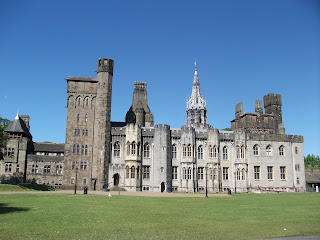 Our
first stop was the Keep, a spider-infested structure with a high tower that
gave us a panoramic view of Cardiff, including the ducks sitting on the high
walls. We climbed down for our tour of the house, one of the Bute family’s many
vacation homes. The tour started at the bottom of the clock tower, an
intricately decorated room called the Winter Smoking Room, with a theme of
time, from the zodiac on the ceiling, to the seasons on the walls, to the days
of the week pictured on the windows in the form of Norse gods, as well as the small
decorations depicting sunrise, midday, sunset, and nighttime. The only thing
not centered on time was the decoration over the fireplace, with an inscription
that read, “Love conquers all, so let us give in to love.” Under this were a
series of pictures showing couple winter activities. Since the Winter Smoking
Room was a men’s only room, above the door leading to the room, was a monster’s
head to scare the women.
Our
first stop was the Keep, a spider-infested structure with a high tower that
gave us a panoramic view of Cardiff, including the ducks sitting on the high
walls. We climbed down for our tour of the house, one of the Bute family’s many
vacation homes. The tour started at the bottom of the clock tower, an
intricately decorated room called the Winter Smoking Room, with a theme of
time, from the zodiac on the ceiling, to the seasons on the walls, to the days
of the week pictured on the windows in the form of Norse gods, as well as the small
decorations depicting sunrise, midday, sunset, and nighttime. The only thing
not centered on time was the decoration over the fireplace, with an inscription
that read, “Love conquers all, so let us give in to love.” Under this were a
series of pictures showing couple winter activities. Since the Winter Smoking
Room was a men’s only room, above the door leading to the room, was a monster’s
head to scare the women.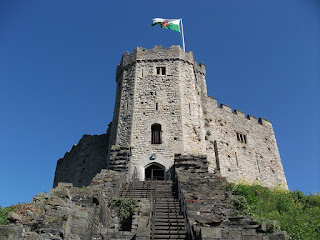 Our
next stop was the children’s room, adorned with gorgeous pictures of fairy
tales such as Sleeping Beauty, Aladdin, Red Riding Hood, Robin Hood, and the
Invisible Prince. The lanterns had children’s rhymes carved on them, such as
‘Mary, Mary, quite contrary’, “Three Men in a Boat’, and ‘Hey Diddle Diddle’.
Our
next stop was the children’s room, adorned with gorgeous pictures of fairy
tales such as Sleeping Beauty, Aladdin, Red Riding Hood, Robin Hood, and the
Invisible Prince. The lanterns had children’s rhymes carved on them, such as
‘Mary, Mary, quite contrary’, “Three Men in a Boat’, and ‘Hey Diddle Diddle’.
Next,
we were led to the banquet hall, which had a historical theme. The ceiling was
a sort of family tree, painted with the family crests of the Bute’s ancestors. On
the walls was the story of Robert of Glouster. It was a huge room that actually
used to be two rooms on two floors.
We
next visited John Bute’s small bedroom, which had a more religious theme. His
patron saint, John the Evangelist, was pictured in the form of a large golden
statue above the fireplace. Since John is thought to have written the book of
Revelations, the 7 churches of Asia Minor are shown in the windows.
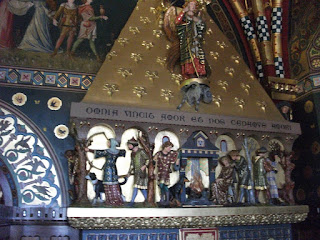 Then
we went up to the roof garden, a once open-roofed building (now with a ceiling
to preserve the room). In the center is a fountain with fish and beavers, in
the center of a series of gutters that form the shape of a cross. The walls
have the story of Elijah on them, and the back of the room has a statue of the
Madonna and child, strategically placed so that at sundown, the light of the
sun shines on the Madonna’s face.
Then
we went up to the roof garden, a once open-roofed building (now with a ceiling
to preserve the room). In the center is a fountain with fish and beavers, in
the center of a series of gutters that form the shape of a cross. The walls
have the story of Elijah on them, and the back of the room has a statue of the
Madonna and child, strategically placed so that at sundown, the light of the
sun shines on the Madonna’s face.  Our
next stop was the small dining room, which was elaborately decorated, but the
main attraction was the table. It was ordinary, except for a strange hole in
the middle. We learned that this was used to put grape vines in, so that after
dinner, the family could pick grapes. ??? Anyway, we also found out that John
Bute made wine, but since it was not very good wine, over 12,000 bottles of it
were found in the cellar.
Our
next stop was the small dining room, which was elaborately decorated, but the
main attraction was the table. It was ordinary, except for a strange hole in
the middle. We learned that this was used to put grape vines in, so that after
dinner, the family could pick grapes. ??? Anyway, we also found out that John
Bute made wine, but since it was not very good wine, over 12,000 bottles of it
were found in the cellar.
Lastly,
we went to the library, which was full of beautifully bound books. There were
busts of several famous authors, and the walls were lined with small paintings
of other famous writers, such as Dante and Byron.
The
entire house was wonderful.
After
our tour, we went to the Museum of the Roman Legion, which was small, but
housed a collection of artifacts, such as beads, and a stone tomb.
 We
walked to the Roman barracks, now a stone foundation. Apparently, in two of the
tiny stone structures, 8 people slept, so I assume they slept on top of each
other, since there was almost no room for any other arrangement. We passed the
kitchen and toilets, and trekked to the amphitheater.
We
walked to the Roman barracks, now a stone foundation. Apparently, in two of the
tiny stone structures, 8 people slept, so I assume they slept on top of each
other, since there was almost no room for any other arrangement. We passed the
kitchen and toilets, and trekked to the amphitheater.
The
amphitheater was low in the ground, so there were steep steps down into it. I
mostly spent my time here gazing at the native cows, who were mooing quite
plaintively. I did, however, devote some of my time to the actual place of
historical significance. Some.
Our
final history lesson of the day came at the site of a Roman bath house, now
housed in a museum with a fantastic light show. In the foundations were several
interesting things, for one, the footprint of a Roman. In addition, the paw
prints of both a cat and a dog were present. The museum had on display some of
the tools used for bathing, including a strigil, a device used for scraping oil
off yourself.
After
this, we wandered around some before catching a bus back to our hostel for the
night.
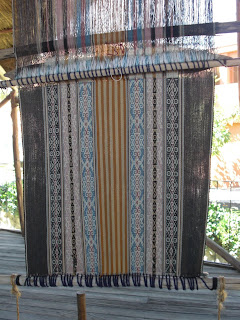
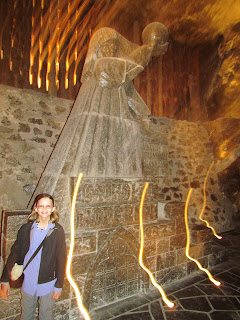
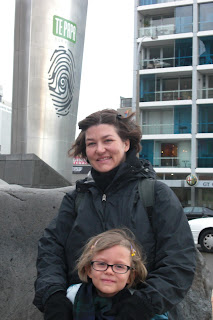
Comments